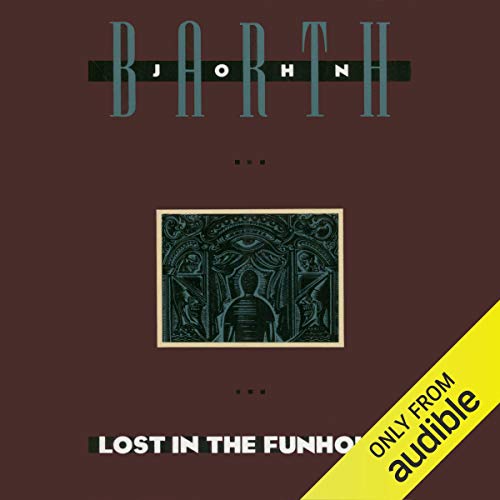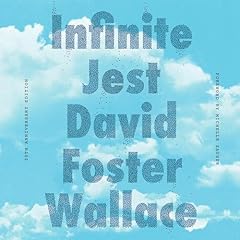
Lost in the Funhouse
No se pudo agregar al carrito
Add to Cart failed.
Error al Agregar a Lista de Deseos.
Error al eliminar de la lista de deseos.
Error al añadir a tu biblioteca
Error al seguir el podcast
Error al dejar de seguir el podcast
 Exclusivo para miembros Prime: ¿Nuevo en Audible? Obtén 2 audiolibros gratis con tu prueba.
Exclusivo para miembros Prime: ¿Nuevo en Audible? Obtén 2 audiolibros gratis con tu prueba.Compra ahora por $19.07
-
Narrado por:
-
Kevin Pariseau
-
De:
-
John Barth
John Barth's lively, highly original collection of short pieces is a major landmark of experimental fiction. Though many of the stories gathered here were published separately, there are several themes common to them all, giving them new meaning in the context of this collection.
©1968 John Barth (P)2011 Audible, Inc.Los oyentes también disfrutaron:











Las personas que vieron esto también vieron:


















If you could sum up Lost in the Funhouse in three words, what would they be?
Exploratory Avant-garde fictionWhat did you like best about this story?
It is an exploration of new directions that fiction has taken since 1960 by a master of the short story form. Starting with a "first-person" story about a spermatozoan's travel during the course of conception, wending its way through stories which are set in the past yet include present and future, simultaneous alternate narratives that are linked yet disparate, stories that include formal commentaries on themselves, this genre-busting, form-twisting collection/novel answered a criticism of the time that fiction was nearly exhausted, and paved a road that modern writing would take up to the present day. Other than that, it was pretty good.Which scene was your favorite?
The stories that made formal comments about themselves, such as first declaiming an action or dialogue, then pointing out how such passages 'should' act in a work of fiction, or where they belonged in a plot structure.Was this a book you wanted to listen to all in one sitting?
No - it ws too intense, and required a significant amount of thinking before and during each story.Any additional comments?
I later found a good (and free) commentary on the work by Yale's Amy Hungerford in her course "The American Novel Since 1945," down-loadable as an mp3 or transcript from Open Yale Courses. Barth was one of her professors at Johns Hopkins. Like Joyce's 'Finnegan's Wake,' someone needed to write this, but no one should attempt it again.A Postmodern Classic
Se ha producido un error. Vuelve a intentarlo dentro de unos minutos.
Barth wrote a novel for himself. He wrote a novel to himself. He doesn't care about you. He is not writing for you. He is not going to make you eat yourshort fiction or even make you shoot the gun sitting on the fictional wall next to you.
Barth makes me sometimes regret my decision to not go to Johns Hopkins. What was I thinking? Perhaps, I could have met Barth. Perhaps, I did go to Johns Hopkins and I did meet Barth in another story in another life. Or, perhaps, I just don't remember, or perhaps I am dreaming I lived a life where I didn't meet Barth.
Why am I trying to even write a Meta-review of Barth well developed for its age? It is all that is left when or after (when is always in the midst of becoming after) I figure I really have both nothing to say and saying anything would be wrong or too much. This book explodes everywhere. Examining :: exhuming :: exhausting each fragment would be too much work too soon.
Everything about Barth has already been transmitted, written about, alluded to, sketched on the soft walls of a thousand reflective uteruses by a million different swimming swimmers prior to drowning. I have nothing left to add. Nothing new that I can capture. No heritage to contribute. No flower to pollinate. No stylized ambition. No original thoughts. The WORLD and the WORD are both paraded parodies WE.
Darwin ate (U) his mark.
Se ha producido un error. Vuelve a intentarlo dentro de unos minutos.
Need a quiet space and no distractions.
Se ha producido un error. Vuelve a intentarlo dentro de unos minutos.
For phonies, the Funhouse is love.
But for whom, the proles grouse,
is the Funhouse a house?
Who lives there when push comes the shove?
--DFW
For Whom is The Funhouse Fun?
Se ha producido un error. Vuelve a intentarlo dentro de unos minutos.
TKO
Se ha producido un error. Vuelve a intentarlo dentro de unos minutos.


